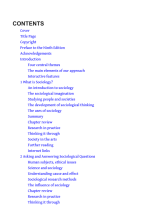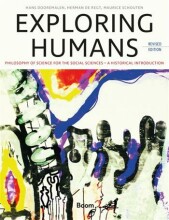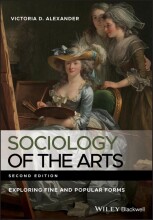Summary: Sociology | 9781509539239 | Anthony Giddens, et al
- This + 400k other summaries
- A unique study and practice tool
- Never study anything twice again
- Get the grades you hope for
- 100% sure, 100% understanding
Read the summary and the most important questions on Sociology | 9781509539239 | Anthony Giddens; Philip W. Sutton
-
1 What is Sociology
-
1.2 The sociological imagination
-
What do we mean with sociological imagination?
Famous phrase byAmerican sociologist C .Wright Mills in1970 .Step outside of theimmediacy of your ownpersonal circumstances to see (or imagine) things in a wider social context.
-
1.3 Studying people and societies
-
When sociologists speak of a society, what do they mean?
A group of people living in a bounded territory who share common cultural features such as language, values and basic norms of behaviour. -
When we "think sociologically," we think about social life through 3 concepts.Which 3 concepts?
- Through the concept of society.
- Through the concept of institutions.
- Through the concept of social structures.
- Through the concept of society.
-
American sociologist C. Wright Mills distinguishes issues into 'personal trouble' and 'public issues.'What do they mean and what is the difference?
- Personal trouble is an issue that may be emotionally traumatic for individuals who go through it.
- A public issue arrises when a problem expresses broad economic and social trends.
- The difference is that although a problem can be a personal trouble in its core, the repercussions of that problem could affect many people, making it a public issue.
- Personal trouble is an issue that may be emotionally traumatic for individuals who go through it.
-
"For sociologists there is no such thing as the 'isolated individual.' What is an isolated individual?
- Someone who makes choices without reference to anyone else.
- I.e., everyone is influenced by social contexts.
-
"Human societies are always in the process of structuration" (Giddens, 1984).What does this mean?
- Human societies are reconstructed at every moment by the human beings that compose them.
- I.e., Society is shaped by the combined individual choices of every person that lives in that society.
-
1.4 The development of sociological thinking
This is a preview. There are 2 more flashcards available for chapter 1.4
Show more cards here -
Before the rise of modern sciences, folkways held sway in most communities.What does 'folkways' mean?
Traditional knowledge and practices passed down through generations. -
What did the founding sociologists mean with the word modernity?
- The societies of primarily
Europe andNorth America . - I.e., their focus was on this region, what they called the "modern world."
- The societies of primarily
-
What can you tell about postcolonialism, in regards to sociology?
- A movement of the last 25 years that challenged the accepted account of modernity and the origins of sociology.
- 2 main elements in this challenge:
- Sociology has generally not taken enough account of the devastating impact of colonialism on countries in the Global South.
- Sociology adopted a fundamentally Eurocentric position, primarily focused on the industrialized countries of the Global North, because of the lack of Global South perspectives.
-
1.4.1 Auguste Comte
This is a preview. There are 2 more flashcards available for chapter 1.4.1
Show more cards here -
Auguste Comte (1798-1857) wanted a positivist approach in sociology.What does this mean?
- Aiming to produce knowledge about society based on evidence drawn from:
- Observation.
- Comparison.
- Experimentation.
- Aiming to produce knowledge about society based on evidence drawn from:
- Higher grades + faster learning
- Never study anything twice
- 100% sure, 100% understanding
Topics related to Summary: Sociology
-
What is Sociology - The development of sociological thinking
-
What is Sociology - Neglected founders of sociology - W.E.B. Du Bois
-
What is Sociology - Thinking Critically
-
Theories and Perspectives - Towards Sociology
-
Theories and Perspectives - Challenging mainstream sociology - Poststructuralism
-
Theories and Perspectives - Societies and sociology in transformation - Reflexivity, risk and cosmopolitan theory
-
Globalization and Social Change - Early societies and civilizations
-
Globalization and Social Change - The Transformation of societies
-
Globalization and Social Change - Globalization - Elements of globalization
-
Globalization and Social Change - Globalization - Structuring the globalization debate
-
Global inequality - Measuring economic inequality
-
Global inequality - Unequal life chances
-
Global inequality - The changing human population - Population analysis: demography
-
The changing human population - Dynamics of population change - Malthusian concerns
-
The changing human population - The demographic transition
-
Global inequality - Development theories and their critics
-
Stratification and Social Class - Systems of stratification
-
Stratification and Social Class - Theorizing social class
-
Stratification and Social Class - Mapping the class structure
-
Social interaction and Daily Life - Studying the micro level
-
Social interaction and Daily Life - Actors, stage-sets and complementary roles
-
Education - Theories of education and schooling - Education as socialization
-
Theories of education and schooling - Education and cultural reproduction
-
Education - Theories of education and schooling - Education, cultural capital and the formation of 'habitus
-
Work and Employment - What is work? - Definitions and types of work
-
Work and Employment - What is work? - Trade unions in decline?
-
Work and Employment - Transforming the world of work - Scientific management and Fordism
-
Work and Employment - Transforming the world of work - Post-Fordist change
































